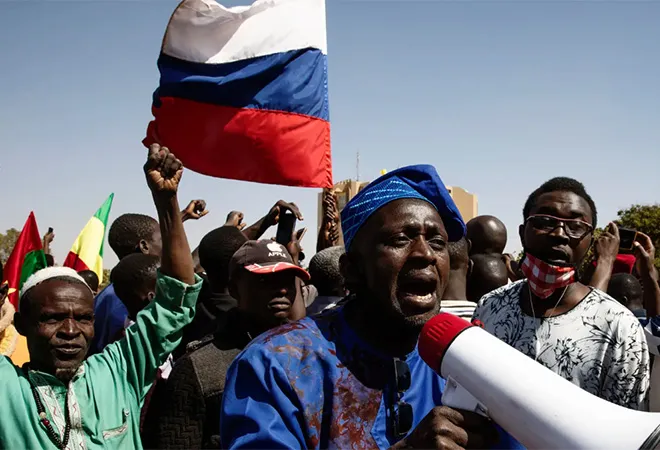
It has been one year since the Russia-Ukraine conflict broke out, disrupting global food and energy prices and leaving many countries reeling from its aftershocks. Despite being physically miles away from the conflict zone, the African countries have not been spared from bearing the brunt of rising prices of food, agricultural products, and costs of living. Western nations’ surprise at most African countries’ neutral stance towards the conflict highlights today’s complex geopolitical realities and Africa’s historical resentment of Western domination in world affairs.
The Ukraine conflict has had an unsettling impact on the lives of ordinary Africans. For example, according to the African Development World Bank, the conflict drove the prices of wheat, a staple food across the continent, up by
nearly 60 percent due to shortages. Both Russia and Ukraine produced and exported wheat to several countries. Together, they were responsible for
44 percent of Africa’s wheat consumption between 2018 and 2020. Naturally, after the conflict broke out, a sudden spike in wheat and bread prices disrupted the lives of ordinary Africans. The prices of maize and other grains have also been affected in addition to a spike in fertiliser prices. The overall rise in the cost of living, fuel prices, and supply chain disruptions for petroleum products has tested Africa’s social, economic, and political resilience over the last year. The question now remains: How can African countries can reorganise themselves out of this quagmire?
For Africa, the consequences of the Russia-Ukraine crisis have potentially transcended economic and social outcomes. There is a looming fear of the resumption of proxy conflicts, weakening commitment to democratisation, and undermining of African multilateralism. Ever since the conflict started, the United States (US), European and other Western governments have been scrutinising Africa’s reaction and positions on the conflict. African votes in the United Nations (UN) on the war revealed sharp divisions. While some countries condemned Russian aggression, others resorted to a ‘non-aligned’ position with many countries abstaining from voting.
For Africa, the consequences of the Russia-Ukraine crisis have potentially transcended economic and social outcomes. There is a looming fear of the resumption of proxy conflicts, weakening commitment to democratisation, and undermining of African multilateralism.
On 2 March 2022,
17 African nations abstained from the UN vote condemning Russia. This number rose on 7 April 2022, when
22 African countries, which included powerhouses like Nigeria, abstained from voting to suspend Russia from the UN Human Rights Council. Similarly, on 12 October 2022, a total of 35 states including India, China, and 19 African countries abstained from voting on a UN General Assembly resolution, which called on the international community not to recognise any of Moscow’s annexation claims.
What explains Africa’s divergent voting patterns?
It is wrong to assume that Africa is a political monolith. On matters of peace and security, there have been many previous examples that highlight divergent African stances such as the
2011 Libyan Uprising and the ousting of Libyan leader Muammar Gaddafi by the North Atlantic Treaty Organization (NATO). The cancellation of the African Union’s (AU) Peace & Security Council (PSC)
decision for military intervention, through the deployment of an African Mission for Prevention and Protection in Burundi (MAPROBU), even without the consent of the host government back in 2015 drew equivocal sentiments. Other examples include the PSC’s ambiguous position on the maritime dispute between Kenya and Somalia, and contradicting positions on the question of suspension of membership from the AU. For instance, while some African countries pushed for the
suspension of Chad from the AU following its unconstitutional transition in April 2021, the same African countries were against Zimbabwe’s suspension after the 2018 coup which overthrew late President Robert Mugabe.
While some states propose a rules-based international order, others sympathise with countries like Russia, which is challenging this very order.
It is useful to note that all African countries bring different norms and values. While some states propose a rules-based international order, others sympathise with countries like Russia, which is challenging this very order. But what explains such contradictions? Is it a reflection of the crisis of multilateralism that African countries are currently facing? The AU’s failure to manage post-coup transitions, confusion over the responsibilities of the AU vs Africa’s regional economic communities (RECs), and its difficulties surrounding sanctions and suspension regimes, points towards a
crisis of African multilateralism.
Although for now, Africa has tried to keep a safe distance from the war, there are limits to neutrality. In such times, it is incumbent upon African leaders to keep their national interest at heart. There are practical reasons why Russia elicits more support than Ukraine from Africans. Firstly, Russia’s colonial past did not extend to Africa. Moscow even backed some of the liberation movements in the continent during the 1950s and 1960s, and has consistently used numerous ways to disseminate anti-Western propaganda. In several ways, the rhetoric of anti-imperialism continues to guide African citizens and leaders’ opinions when it comes to Moscow. Secondly, Russia has aggressively tried to increase its military cooperation with African countries. According to Stockholm International Peace Research Institute (SIPRI), between 2017 and 2021, Moscow accounted for
44 percent of Africa’s weapons purchases. Russian military support through mercenary forces like the
Wagner Group has been a constant feature of Russia’s engagement in countries like Sudan, Syria, Mozambique, the Central African Republic, Libya, and Mali.
Meanwhile, South Africa has come under
intense criticism for partaking in the ongoing joint multilateral maritime exercise, Exercise Mosi II, with Russia and China. The political and diplomatic optics of the move and its timing is sending a message to the US and the West of Beijing’s growing clout in the region. It also provides Russia with a platform to continue conducting its international relations and at the same time, feeds into China’s rhetoric of building an ocean community with a shared future.
What’s next for Russia-Africa ties?
It is difficult to ascertain the extent of Russian inroads on the African continent, especially at the grassroots level. However, as we enter the first anniversary of Russia’s invasion of Ukraine, one thing is certain, Russia once again finds itself isolated from the West. Naturally, this makes the Kremlin’s relationship with Africa all the more important for its foreign policy success. For African countries, the Russo-Ukrainian crisis remains a sensitive issue either due to the fear of retaliation through disinformation campaigns or due to significant economic dependence and Russian diplomatic and military engagements. African leaders and governments are constantly under pressure to accommodate domestic public opinion on Russia.
However, it would be premature to assume that Russia is attaining only positive resonance on the continent. Research from African think tanks like South African Institute for International Affairs (SAIIA) where social media data from African countries were analysed
points towards general indifference and reticence on the part of African citizens to associate with Moscow. As the Russia-Africa summit is scheduled to be held in Saint Petersburg in July 2023, it would be interesting to follow how Moscow and Africa’s complex relationship evolves. For African countries, the best course of action is to continue to demand peace and urge diplomacy.
The views expressed above belong to the author(s). ORF research and analyses now available on Telegram! Click here to access our curated content — blogs, longforms and interviews.



 It has been one year since the Russia-Ukraine conflict broke out, disrupting global food and energy prices and leaving many countries reeling from its aftershocks. Despite being physically miles away from the conflict zone, the African countries have not been spared from bearing the brunt of rising prices of food, agricultural products, and costs of living. Western nations’ surprise at most African countries’ neutral stance towards the conflict highlights today’s complex geopolitical realities and Africa’s historical resentment of Western domination in world affairs.
The Ukraine conflict has had an unsettling impact on the lives of ordinary Africans. For example, according to the African Development World Bank, the conflict drove the prices of wheat, a staple food across the continent, up by
It has been one year since the Russia-Ukraine conflict broke out, disrupting global food and energy prices and leaving many countries reeling from its aftershocks. Despite being physically miles away from the conflict zone, the African countries have not been spared from bearing the brunt of rising prices of food, agricultural products, and costs of living. Western nations’ surprise at most African countries’ neutral stance towards the conflict highlights today’s complex geopolitical realities and Africa’s historical resentment of Western domination in world affairs.
The Ukraine conflict has had an unsettling impact on the lives of ordinary Africans. For example, according to the African Development World Bank, the conflict drove the prices of wheat, a staple food across the continent, up by  PREV
PREV


